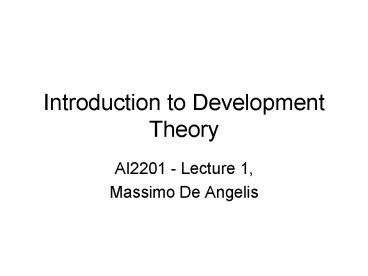Introduction to Development Theory - PowerPoint PPT Presentation
1 / 9
Title:
Introduction to Development Theory
Description:
The definition of the object of the theory/discourse depends on the theory/discourse ... Rationalism = Knowledge as essentially the product of thought. ... – PowerPoint PPT presentation
Number of Views:43
Avg rating:3.0/5.0
Title: Introduction to Development Theory
1
Introduction to Development Theory
- AI2201 - Lecture 1,
- Massimo De Angelis
2
Two questions
- Q1 What is development theory?
- Q2 What is development?
- The two questions are related.
- The definition of the object of the
theory/discourse depends on the theory/discourse
3
Q1. Development theory
- Q1.1 Development theory as a form of social
theorizing. - Q1.2 Development theory and conceptions of
social change - Q1.3 Development theory and the question of
agency (who are the actors)
4
Q1.1 The theorists commitments
- ST is founded on 4 commitments
- Ontological (and phenomenological)
- Claims on what the world is and how it manifests
itself - Epistemological
- Claims on what knowledge is and how it is
produced. - Methodological
- Claims on what are the methods to be used to
produce knowledge - Practical
- Claims on what are the practical implications of
the theory (e.g. policy implications, business
implications, political implications . . .)
5
Q1.1 Epistemologys classic dichotomy
- Empiricism gt Knowledge as essentially the
product of experience - social science must be like a natural science
- Concerned to describe how things are in fact
- Rationalism gt Knowledge as essentially the
product of thought. - social science is a variety of social philosophy
- Interested in understanding patterns of culture.
- Dialectic between facts and thought
- you construct facts depending on rules of
explusion/inclusions (values) - you think of patterns of culture on the basis of
facts
6
Q1.1 Social theorizing the bottom line
- All practices of social theorizing (ST) are forms
of narratives, i.e. story telling (st). - All forms of st are
- self-referential (i.e. their narrative
construction refers, explicitly or, more often,
implicitly, to given premises) - Predicated on inter-subjective agreements and
conceptual grids gt The given premises are shared
among a community of scholars/actors - Values (rules of inclusion-exclusion or goods
and bads) are embedded in inter-subjective
agreements
7
Q1.2 Development theory and different
conceptions of social change
- Two basic metaphors
- continuity (evolution) and rupture (revolution)
- evolution
- Charles Darwin and Herbert Spencer
- Metaphors such as
- Survival of the fittest,
- inreasing complexity (from traditioal to modern
social forms, - Unitary direction of change
- revolution
- Karl Marx and Ivan Illich Lenin
- Interplay of class interests through history
provides motor of changes - History is history of class struggle
- to be truly reformist I.e. evolutionary one
has to be a revolutionary (Toni Negri)
8
Q 1.3 Ethic of change progress
- The notion of progress
- For the liberal-democratic
- Analysis of society within a general evolutionary
framework - Evoked model of man as the consumer.
- Humankind acts on the basis of selfish wants
- Historical change is implausible and
unintelligible - For the radical-democratic
- man as the doer
- Humankind act in light of changing social goals
- Historical change is plausible and intelligible
9
Q. 2. What counts as progress or development?
- Liberal market discourse
- Progress economic growth
- Send the experts to implement free market
policies - Represents the view of the hard core of
development experts (mostly neoclassical
economists working in IFIs or UN) - Social market discourse
- Progress is equated with planned/ordered control
- Common sense view of development among other-
than-economists experts - Often work in association with first group
- Radical democratic discourse
- Progress must be defined from below
- Range of critiques of official development
discourses - link to social struggle and bottom up
alternatives.































